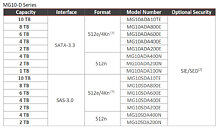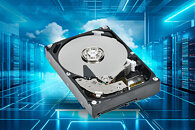- Joined
- May 21, 2024
- Messages
- 1,016 (3.46/day)
Toshiba Electronics Europe GmbH (Toshiba) announces the release of its MG10-D Series, a family of air-filled conventional magnetic recording (CMR) HDDs supporting SAS and SATA interfaces and capacities of up to 10 TB. Crafted with precision engineering and over 50 years of Toshiba experience, the MG10-D Series delivers improved performance and power efficiency over prior generations. With sanitize instant erase (SIE) and self-encrypting drive (SED) options, valuable data is safeguarded by a storage solution known for its robust performance and unwavering dependability.
Built for the increasing application demands of enterprise server and storage solutions, the MG10-D Series delivers a new level of performance. For example, compared with the previous model, the new 10 TB MG10ADA10TE provides an approximately 13% better maximum sustained transfer speed of 268MiB/s and doubles the cache buffer size to 512MiB. It also reduces power consumption in active idle mode by approximately 21%, to 5.74 W. Architected to deliver improved total cost of ownership (TCO), the new MG10-D Series fits seamlessly into a wide variety of business-critical applications, such as email, data analytics, data retention, and surveillance.


"Toshiba's MG10-D Series delivers exceptional performance to meet the demands of growing business critical applications. The new cutting-edge design of the MG10-D Series is engineered for sustainable enterprise environments and fits seamlessly into existing infrastructure reducing TCO," said Larry Martinez-Palomo, Vice President, Head of Storage Products Division at Toshiba.
The MG10-D Series is a 5-disk CMR standard 3.5-inch, 7200 RPM air-filled platform. Available capacities are 2 TB, 4 TB, 6 TB, 8 TB, and 10 TB for both SAS and SATA. SATA is also available in a 1 TB drive. The series supports 6 Gb/s SATA or 12 Gb/s SAS interface options in Advanced format 512e and 4Kn. A 512n option is available on the 1 TB, 2 TB, and 4 TB offerings to support legacy systems with native 512 byte block sizes. Designed for 24x7 enterprise reliability, the MG10-D Series has a workload rating of 550 TB, an AFR of 0.44% and an MTTF/MTBF of 2M hours.
The MG10-D Series will be available in CQ3.
View at TechPowerUp Main Site | Source
Built for the increasing application demands of enterprise server and storage solutions, the MG10-D Series delivers a new level of performance. For example, compared with the previous model, the new 10 TB MG10ADA10TE provides an approximately 13% better maximum sustained transfer speed of 268MiB/s and doubles the cache buffer size to 512MiB. It also reduces power consumption in active idle mode by approximately 21%, to 5.74 W. Architected to deliver improved total cost of ownership (TCO), the new MG10-D Series fits seamlessly into a wide variety of business-critical applications, such as email, data analytics, data retention, and surveillance.


"Toshiba's MG10-D Series delivers exceptional performance to meet the demands of growing business critical applications. The new cutting-edge design of the MG10-D Series is engineered for sustainable enterprise environments and fits seamlessly into existing infrastructure reducing TCO," said Larry Martinez-Palomo, Vice President, Head of Storage Products Division at Toshiba.
The MG10-D Series is a 5-disk CMR standard 3.5-inch, 7200 RPM air-filled platform. Available capacities are 2 TB, 4 TB, 6 TB, 8 TB, and 10 TB for both SAS and SATA. SATA is also available in a 1 TB drive. The series supports 6 Gb/s SATA or 12 Gb/s SAS interface options in Advanced format 512e and 4Kn. A 512n option is available on the 1 TB, 2 TB, and 4 TB offerings to support legacy systems with native 512 byte block sizes. Designed for 24x7 enterprise reliability, the MG10-D Series has a workload rating of 550 TB, an AFR of 0.44% and an MTTF/MTBF of 2M hours.
The MG10-D Series will be available in CQ3.
View at TechPowerUp Main Site | Source




